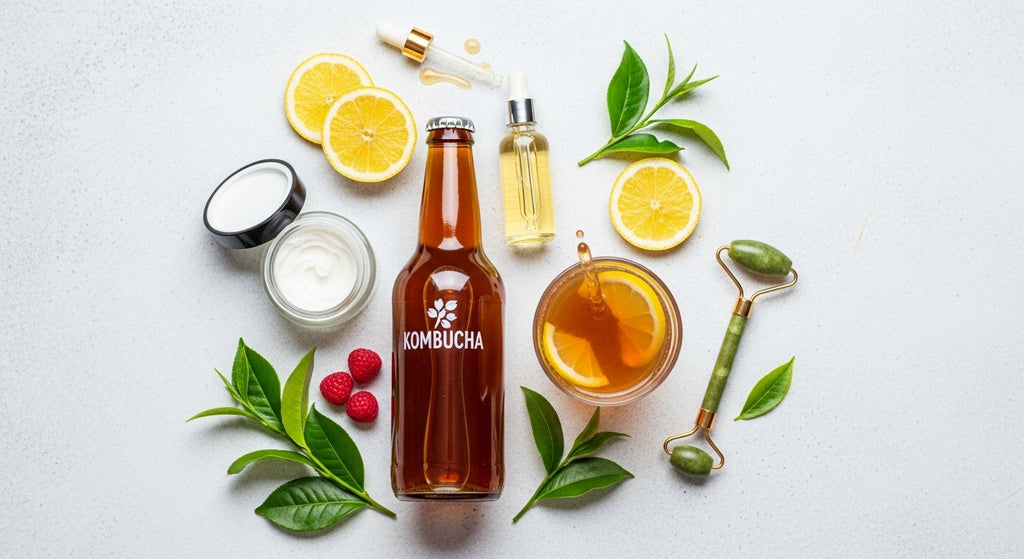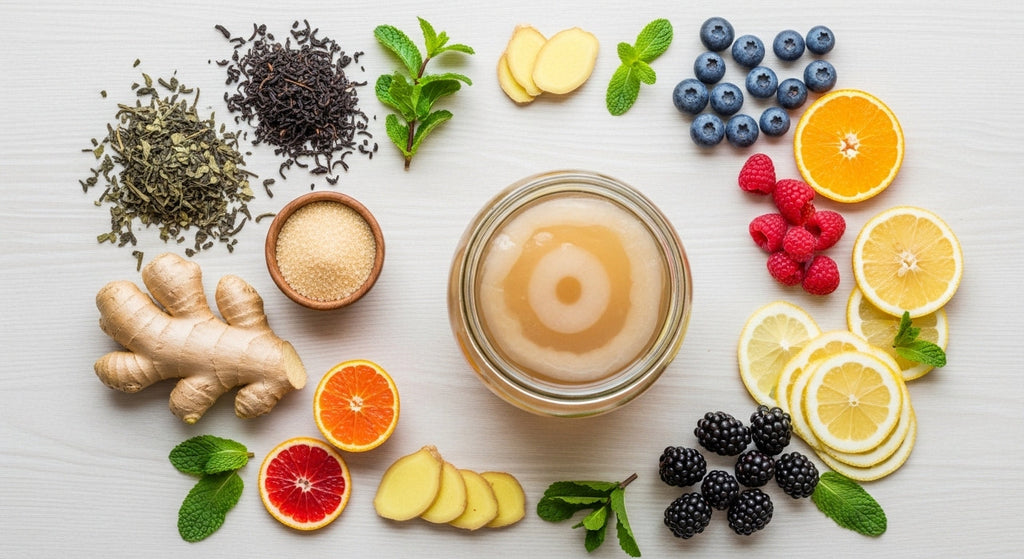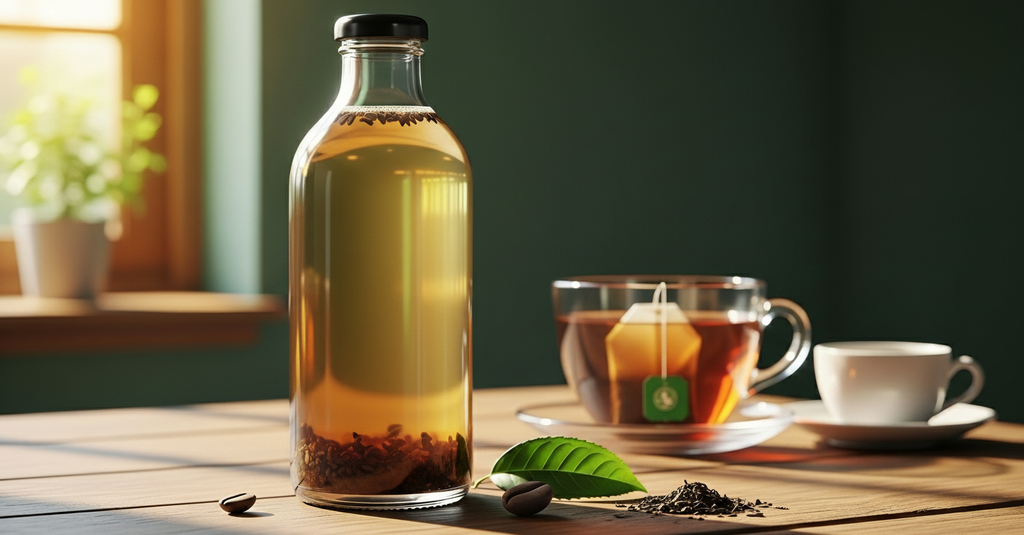
Kombucha Benefits for Skin: How This Fermented Tea Gives You a Natural Glow

Kombucha Benefits for Skin: How This Fermented Tea Gives You a Natural Glow
Kombucha, the bubbly and tangy fermented tea, has earned its place in the spotlight for its wellness perks. But beyond its gut-friendly fame, kombucha also offers serious skincare benefits. Packed with probiotics, antioxidants, vitamins, and organic acids, this ancient brew supports your skin from the inside out. From reducing inflammation to improving hydration, kombucha may be the secret weapon your skincare routine is missing.
Key Nutrients in Kombucha That Nourish Your Skin
Kombucha’s benefits for skin come from its complex nutrient mix. Here are the key players:
-
Probiotics: Healthy gut bacteria (Lactobacillus, Bifidobacterium, Acetobacter, etc.) support digestion and immune balance. A balanced gut microbiome helps reduce systemic inflammation that can cause skin issues like acne or eczema. In fact, experts note that what’s good for your gut is often good for your skin: “The trillions of bacteria in our gut affect every part of our body – from immunity to … skin”.
-
Polyphenols & Catechins: These are powerful antioxidants found in tea. Kombucha’s fermentation process actually enhances their effectiveness: microbial enzymes break down tea polyphenols into more active forms, so kombucha ends up with even higher antioxidant activity than the original tea. These antioxidants fight free radicals and environmental stress, preventing premature aging. Research shows catechins (a type of polyphenol) from kombucha can reduce skin damage, boost collagen synthesis, and inhibit collagen‑degrading enzymes – all of which help keep skin firm and youthful.
-
Vitamins: Kombucha contains vitamins C and several B’s (B1, B2, B6, B12). Vitamin C is crucial for collagen production and protecting skin from sun damage. B-vitamins in kombucha aid in cell metabolism and repair. An MDPI study notes that kombucha’s vitamins and amino acids contribute to its antioxidant, anti-inflammatory, and even moisturizing effects on the skin.
-
Organic Acids: Acetic, lactic and gluconic acids in kombucha have exfoliating and antimicrobial properties. Topically or internally, they help unclog pores and inhibit harmful bacteria. For example, acetic acid (also found in vinegar) is known to kill acne-causing bacteria on the skin’s surface.
-
Minerals: Kombucha contains trace minerals like potassium and manganese, which support overall skin health. Manganese, for instance, is involved in collagen formation and antioxidant defense.
Together, these nutrients mean kombucha is more than just a gut drink – it’s a complex beauty elixir. The antioxidants and acids provide anti-aging, anti-inflammatory and hydrating benefits, while probiotics work from the inside out to clear and brighten the skin.
The Gut–Skin Connection: Probiotics and Inflammation
One of kombucha’s greatest skin benefits comes indirectly through the gut–skin axis. A balanced gut microbiome is linked to clearer, healthier skin. When your gut flora is disrupted (dysbiosis), it can lead to inflammation that shows up as acne, redness, eczema or psoriasis. By drinking probiotic-rich kombucha, you help restore that balance.
Numerous studies back this up. For example, one clinical trial gave acne patients either a probiotic supplement, antibiotics, or both. After 12 weeks, all groups saw significant acne improvement – even the group taking only probiotics. The researchers concluded that probiotics alone (like those in kombucha) can be a therapeutic tool against acne. Similarly, an older study of 300 acne patients found that 80% showed marked improvement when treated with probiotic yogurt cultures.
In plain terms: improving your gut bacteria can help clear skin. Kombucha’s live cultures fight dysbiosis and reduce gut inflammation, which in turn calms skin flare-ups. One kombucha blogger sums it up: “Kombucha, being an oral probiotic, can help you get rid of your acne. Probiotics can eliminate the 3 main root causes of acne: dysbiosis (gut imbalance), inflammation & hormone regulation”. In practice, people notice fewer breakouts and less redness when kombucha becomes a daily habit.
Antioxidants and Anti-Aging
Oxidative stress from free radicals is a major contributor to skin aging – wrinkles, fine lines and loss of elasticity. Kombucha’s high antioxidant load helps neutralize those radicals. The fermentation of tea actually increases kombucha’s polyphenol and flavonoid content. Plus, kombucha is rich in vitamins like C and E (antioxidants).
A 2024 Molecules study notes that kombucha’s bioactive compounds have antioxidant and anti-aging potential when applied to skin. For instance, polyphenols and other plant-based molecules from kombucha inhibit enzymes like collagenase and elastase, which break down collagen and elastin fibers in skin. In one example, kombucha fermented from berry extracts strongly blocked these enzymes and increased skin hydration.
In practical terms, this means kombucha can help your skin maintain its firmness and glow. Antioxidants also even out skin tone by reducing inflammation. NDTV reports that kombucha contains “vitamins, minerals, and organic acids” that reduce inflammation, promote collagen production, and improve overall skin tone and texture. Drinking kombucha regularly can therefore help fade age spots, smooth rough patches, and slow wrinkle formation.
Hydration and Barrier Repair
Beyond antioxidants, some components of kombucha act as natural humectants – they attract and hold onto water. The MDPI Fermentation study explains that during fermentation, simple sugars accumulate and function as humectants in kombucha ferment. This means kombucha can help hydrate the skin by drawing moisture into the deeper layers.
In fact, a comparative study of cosmetic tonics found that kombucha-fermented extracts had a more favorable effect on skin hydration than non-fermented extracts. The fermented solution reduced transepidermal water loss (TEWL) more effectively, essentially sealing in moisture. While we usually drink kombucha, these findings support why some people also use kombucha topically as a toner or face mask – it can soothe dryness and reinforce the skin’s moisture barrier.
So kombucha doesn’t just fight acne and aging: it moisturizes. By supporting the skin’s barrier, it can make skin feel plumper and smoother. Combined with its vitamins and probiotics, this leads to a soft, resilient complexion over time.
Clearing Acne and Soothing Inflammation
Kombucha’s anti-inflammatory and antibacterial properties make it particularly helpful against acne. The organic acids in kombucha (like acetic and lactic acid) are natural antibacterials. When consumed or applied, they help clog fewer pores and reduce acne-causing bacteria on the skin. The Good Bug (a wellness blog) notes that kombucha’s “acetic acid … helps manage acne by targeting acne-causing bacteria and keeping the skin’s pH in check”.
Moreover, kombucha’s probiotics reduce systemic inflammation. Chronic inflammation drives redness, acne and other skin issues. Studies show that probiotic-rich kombucha helps calm inflammation in the body. For example, The Good Bug lists “soothes inflammation” as a key kombucha benefit for conditions like eczema and rosacea. In short, kombucha tackles acne both by killing germs on the skin’s surface and by reducing inflammatory triggers internally.
For those dealing with breakouts, incorporating kombucha can be part of a natural regimen. You can simply drink it daily, and even consider DIY skincare uses: dilute kombucha as a facial toner, or use it in a homemade face mask to exfoliate and balance pH. (Note: Always do a patch test first, since kombucha is acidic.) While topical use is trendy, most of the benefit comes from drinking it and feeding your skin from the inside.
Tips to Use Kombucha for Glowing Skin
-
Drink it regularly: 150–250 ml a few times a week is a great starting point.
-
Choose raw, unpasteurized versions: Pasteurization kills the good bacteria.
-
Watch the sugar content: Lower sugar = better for your skin and gut.
-
Try flavored varieties: Natural flavors like ginger, berry, or hibiscus add enjoyment and extra nutrients.
-
Use it topically (if desired): As a diluted toner or part of a DIY face mask.
Try Kombucha for Your Skin Health
Kombucha isn’t just a trendy drink — it’s a skincare ally. With its unique blend of probiotics, antioxidants, vitamins, and acids, it supports clearer, calmer, and more hydrated skin. When you choose a high-quality brew like Dad’s Hack, you’re not just sipping a fizzy tea — you’re nourishing your skin from the inside out.
Ready to glow from the inside out? Dad’s Hack offers the freshest kombucha for your needs. Buy kombucha online today to start your journey towards healthier skin.




